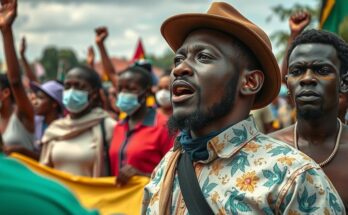The Lobito Corridor aims to connect Angola’s Lobito Port to mineral-rich regions in the DRC, promising economic opportunities but raising concerns among local residents about exploitation and job displacement. While U.S. officials focus on the potential benefits, many fear that the corridor may not sufficiently address local needs or prevent neo-colonial practices, highlighting the complex challenges facing resource-rich nations like the DRC.
The Lobito Corridor, a significant railway project connecting Lobito Port in Angola with various regions in the Democratic Republic of Congo (DRC), has been met with a spectrum of sentiments among local populations. While officials tout its potential to function as a trade hub, many residents fear it may merely serve as a conduit for further exploitation of the DRC’s abundant natural resources. The project aims to facilitate faster transportation of critical minerals, such as cobalt and copper, which are crucial for the global energy transition, linking DRC’s rich mining provinces to international markets. However, concerns regarding job creation and the socioeconomic implications for local communities remain prevalent.
President Joe Biden’s discussions regarding the Lobito project highlight international interest, with promises of thousands of jobs and reduced poverty. Nevertheless, skepticism persists, particularly among local analysts and civil society groups, who warn that any benefits may primarily favor foreign powers and external markets rather than the impoverished Congolese populace. Interviews with residents reflect deep-rooted uncertainties about employment prospects and potential displacement, as the project could marginalize small-scale jobs previously dependent on trucking routes.
Critics label the initiative as a neo-colonial enterprise, suggesting that the DRC risks becoming a mere facilitator for resource extraction rather than achieving significant economic advancement. Calls for local processing of minerals and a more equitable distribution of benefits encapsulate the discontent among communities historically affected by resource exploitation.
As the DRC navigates this complex landscape, the Lobito Corridor stands as a double-edged sword, promising opportunities while evoking legitimate fears about sovereignty and economic integrity. The long-term impacts of this ambitious infrastructure project remain uncertain, raising pressing questions about how it will truly benefit the region and its people.
The Lobito Corridor is an ambitious infrastructure project designed to connect Angola’s Lobito Port with mineral-rich provinces in the Democratic Republic of Congo (DRC). This development is particularly noteworthy due to the DRC’s vast reserves of cobalt and copper, which are critical for global energy needs. U.S. officials, including President Biden, have highlighted the potential for job creation and economic growth. However, the local population and analysts express concerns that the project may become a tool for continued resource exploitation, benefiting foreign entities at the expense of local communities. The complexity of this situation is further compounded by historical instances of neo-colonialism in resource-rich African nations, leading to ongoing debates regarding economic sovereignty and local development. Additionally, the DRC is one of the poorest countries globally, with many of its citizens living below the poverty line despite the wealth of natural resources surrounding them. Previous agreements regarding resource extraction have often favored foreign corporations, which raises skepticism about the benefits of new projects like the Lobito Corridor.
In conclusion, while the Lobito Corridor presents an opportunity for improved regional connectivity and potential job creation, significant doubts remain regarding the actual benefits for the Congolese people. The fears of exploitation, job displacement, and a return to neo-colonial practices underscore the need for careful scrutiny of the project. Ensuring that local communities receive equitable benefits from their resources is essential for fostering genuine economic development and sustainability in the DRC.
Original Source: www.aljazeera.com




